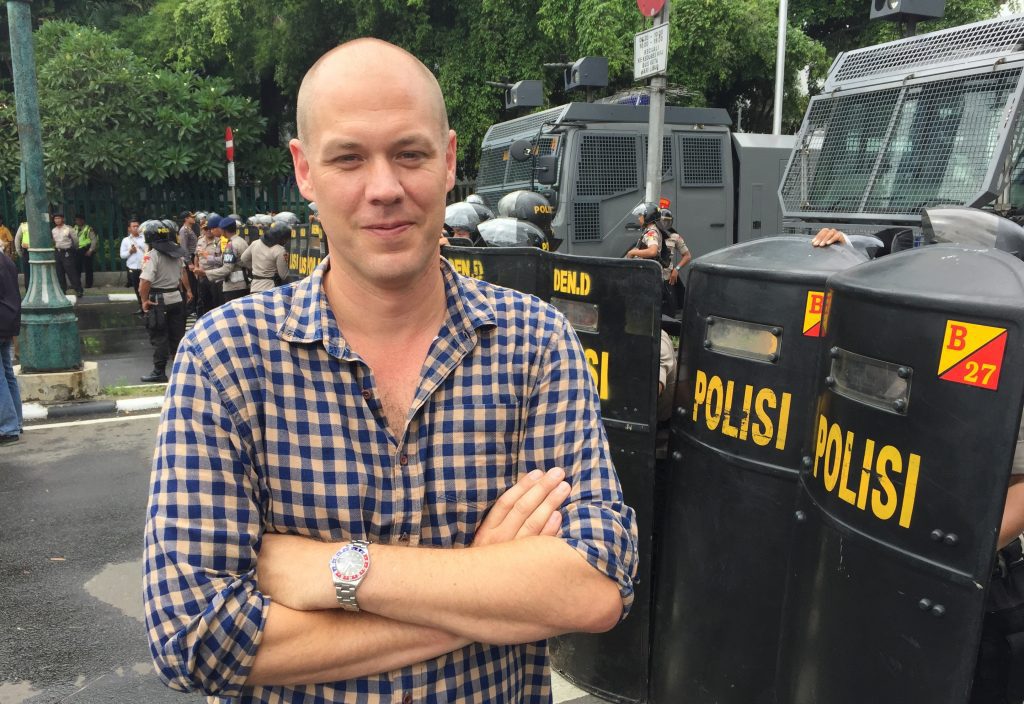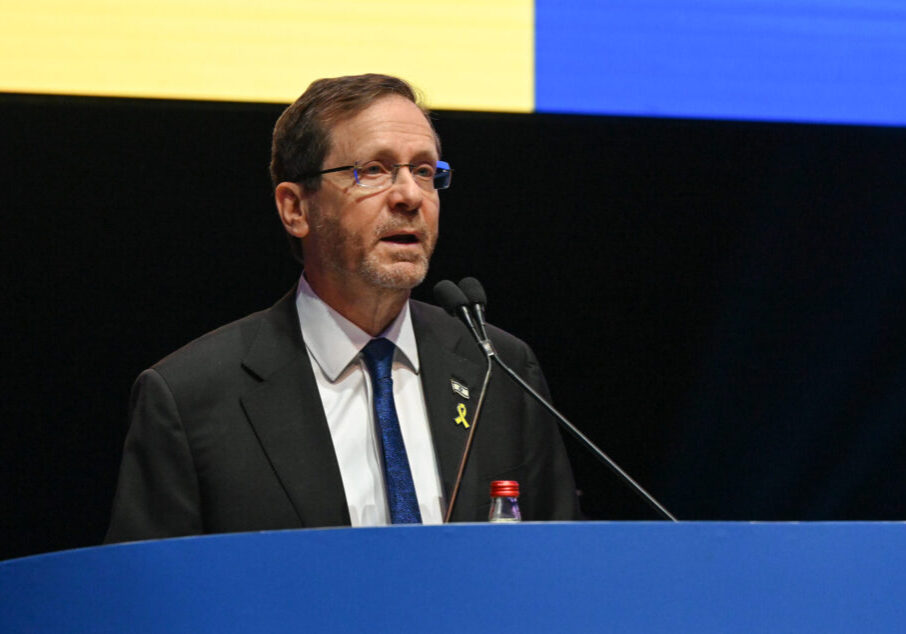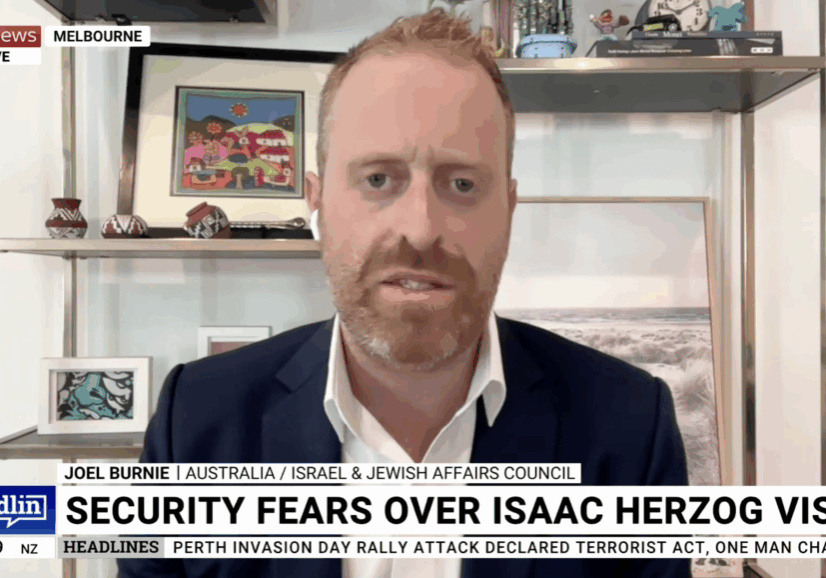Australia/Israel Review
Noted and Quoted – January 2019
Dec 24, 2018 | AIJAC staff

Writing on the wall
With active terror threats on every one of its borders, over the past 20 years, Israel has been upgrading its border security infrastructure. Even before the recent discovery of Hezbollah tunnels into Israel, the Jewish state had been building a high wall with sensors along its northern border with Lebanon to help prevent Hezbollah terror attacks on Israelis.
But it would appear the ABC doesn’t see it that way. An ABC Radio “AM” (Nov. 24) report was mistitled “Israel and Lebanon to build a wall along the border” even though Lebanon has had no role in the new barrier, built completely on Israeli land. Meanwhile, a longer online article by Beirut-based Middle East correspondent Adam Harvey – titled “Israel-Lebanon Blue Line wall to offer war-hit locals peace of mind, but some fears persist” – was entirely from the Lebanese perspective.
Harvey briefly paid lip service to the real impetus for the wall, saying “Israel says the $600 million project is essential to stop Hezbollah fighters from attacking Israelis in the villages and settlements near the border.”
However, ABC audiences were not told that Hezbollah is the de facto government in southern Lebanon and has a blocking veto over the Lebanese national government in Beirut; or of Hezbollah’s repeated threats to invade and occupy northern Israel.
Instead, Israel was portrayed as the real menace.
Harvey interviewed a man from the Lebanese village of Dhayra who said, “Yes, it’s a protection for us, no one can pass the border and enter the village to destroy the house they want, doing whatever they want as before the liberation.”
Israel withdrew from Lebanon in 2000. Israeli forces were forced to return in July 2006 when Hezbollah attacked Israeli soldiers inside Israel, killing three and abducting two more back into Lebanon, sparking a month-long war.
Following the war’s conclusion, UN Resolution 1701 was passed giving the United Nations Interim Force In Lebanon (UNIFIL) a mandate to prevent Hezbollah’s military buildup along the border. But instead of enforcing 1701, UNIFIL has turned a blind eye to Hezbollah’s activities there, which include constructing military bunkers in many villages and an estimated 130,000 missile and rocket stockpile.
Harvey appeared to do the same.
Indeed, he interviewed UNIFIL spokesperson Andrea Tenenti to buttress the story’s narrative that Israel is the real security threat.
According to Harvey, “It will get more complicated later if Israel tries to extend its wall through Lebanese territory that it currently occupies – like at the village of Ghajar.”
This language implied that there are border disputes over areas besides Ghajar, when in fact that is the only one. Ghajar straddles both sides of the border between Israel and the Golan Heights that Israel captured in the 1967 war, but Lebanon claims sovereignty over northern Ghajar.
On “AM”, Tenenti said Israel’s occupation of Ghajar “is a permanent violation of 1701,” making it seem that only Israel is violating the resolution!
As well as avoiding all Israeli perspectives, the reports also did not include the views of anyone from Ghajar, perhaps because it is well documented that its residents strongly oppose any plan to turn over any part of the village to either Lebanese or Syrian control.
Harvey’s tunnel vision
Meanwhile, the revelation on Dec. 4 of three tunnels built by Hezbollah stretching from Lebanon into Israeli territory, which Israeli PM Binyamin Netanyahu described as a “gross violation” of UN Resolution 1701, was not covered by ABC correspondent Adam Harvey or any of the ABC’s flagship current affairs programs.
It was covered in a brief 55-second news reader item on ABC TV “The World” (Dec. 5).
SBS TV “World News” (Dec. 5) reported on the announcement of the tunnels’ discovery. SBS’s website ran an informative piece noting that Hamas, which has built dozens of terror tunnels from Gaza into Israel, has shared tunnel building expertise with Hezbollah. The report also included a strange caption that read “An Israeli military digger destroys the Lebanese-Israeli border,” below a picture showing absolutely no destruction of any sort.
Hostile coverage
ABC “News Radio” (Nov. 13) blamed recent border clashes, without providing adequate context, for Hamas firing over 400 rockets and mortars into Israel that day, prompting Israeli air strikes on Hamas targets in Gaza.
According to the ABC’s Steve Chase, “The latest hostilities hardly come out of nowhere. According to the UN’s humanitarian relief agency, in the six months up to the end of October in and around Gaza, one Israeli has died and 40 have been injured. 228 Palestinians have also died. More than 24,000 have been injured.”
But elsewhere, Mark Sofer, Israel’s Ambassador to Australia, explained the real trigger for the “latest hostilities”, writing, “Since seizing control of Gaza in 2007, Hamas has devoted practically all of its available resources to building up an arsenal of rockets, digging underground tunnels with the sole purpose of infiltrating Israel in order to kill, maim, abduct and terrorise Israeli civilians, financing violent riots at the Gaza-Israel border, bussing Palestinian civilians, including children, into a conflict zone of its own making and preparing and launching thousands of aerial incendiary devices with the sole purpose of generating a situation of scorched earth,” Daily Telegraph (Nov. 15).
Unremarked upon
The high farce whereby the UN General Assembly failed to pass a US-sponsored resolution censuring Hamas’ practice of indiscriminately firing rockets at Israeli civilian population centres and building terror tunnels because Arab and Muslim countries conspired to ensure an extraordinary two-thirds majority was needed, made no impression on the ABC. There was no radio, TV or website coverage, as far as AIJAC was able to determine.
SBS was marginally better, limiting coverage to an online AAP report (Dec. 6) before the UN vote indicating Australia would vote to condemn Hamas. The story said Australian support was a “signal of a further shift towards Israel under Prime Minister Scott Morrison” even though virtually every other Western nation also supported the resolution. A follow-up AAP (Dec. 7) report ran on SBS’s website noting the result.
Ahead of the vote, the Australian’s Simon Benson (Dec. 6) also described the Federal Government’s backing for the resolution as “a further demonstration of the hawkish shift in Middle East policy under Scott Morrison.”
The report noted that, in late November, Australia had voted against six UN General Assembly resolutions that were highly critical of Israel and quoted AIJAC’s Colin Rubenstein and the Executive Council of Australian Jewry’s Peter Wertheim welcoming Australia’s support.
On Nov. 8, Benson filed a story noting Australian Foreign Minister Marise Payne’s statement expressing dissatisfaction with the UN’s failure to criticise Hamas.
Editorial excellence
The Australian editorial (Dec. 7) praised the Morrison Government’s opposition to the six anti-Israel UN resolutions, citing the one on Jerusalem that passed which, “supported by 148 General Assembly members, ignored 3000 years of Jewish history and was ludicrous given Jerusalem has been the Jewish state’s capital since it was founded in 1948. Yet only 10 countries – Australia, the US, Canada, Nauru, Micronesia, Palau, Guatemala, Kiribati, the Marshall Islands and Solomon Islands – stood against this latest manifestation of the UN’s capacity for self-delusion.”
On Dec.11, the paper asserted that the fiasco of the Hamas resolution to pass despite 87 votes being cast in favour of it “illustrates the double standards and mindless anti-Israel bias that continue to dominate the UN. It beggars belief that even more moderate Arab states in the Palestinian conflict such as Saudi Arabia, Egypt, Morocco, Bahrain, Oman and the UAE did not have the courage to support a resolution condemning the constant rocket barrages from Gaza targeted mainly at Israeli villages.” It also highlighted the absurdity of the General Assembly each year passing “20 resolutions fiercely condemning Israel while devoting about seven to the rest of the world, including the slaughter in Syria and massacres in Myanmar.”
Gracefully Wrong
Assessing the situation for Middle East’s Christians this Christmas, Archbishop of Canterbury Justin Welby lamented their plight in Syria and Iraq where they face the threat of extinction due to persecution.
In Lebanon and Jordan, they “live in peace and stability”, he claimed, whilst in Egypt they are “flourishing”.
And how did Archbishop Welby see the situation for Christians in Israel and under Palestinian self-rule in Gaza and the West Bank?
“Even where Christians are secure in physical terms, and have members at the very top of society, in democratic states such as Israel, tensions in the region make life difficult for them. Israeli Arab Christians are impacted in everyday life because their families and communities are broken up by the dividing lines of Israel, the West Bank and Gaza. This context leaves them vulnerable, insecure and looking abroad for the promise of greater wellbeing. The recent Nation State Law, for example, downgrades the status of Arabic in Israeli public life and raises great concerns amongst Christian communities as to whether they are as valued and as equal as Israeli citizens of Jewish tradition.”
Apparently, according to Archbishop Welby, there are no problems faced by Christians under Hamas and Fatah, but they do suffer in Israel.
Israel is the only country in the Middle East where the Christian population has increased over recent decades. In contrast, since the Palestinian Authority was established in 1994, their numbers have plummeted in the West Bank and Gaza.
Moreover, Archbishop Welby was wrong about the Jewish Nation State law, which accords Arabic “special status”, recognises the right of non-Jews to “to maintain days of rest on their Sabbaths and festivals” and importantly does not say Judaism is the official religion of Israel. In contrast, the Palestinian Authority’s basic law says “Islam is the official religion in Palestine.”
Furthermore, Israeli Arab Christians are not prevented from travelling to the Palestinian Authority areas, unlike Israeli Jews.
Welby was also notably wrong in his claims about Christians in Egypt, who have experienced a wave of terrorist bombings, murders, kidnapping and rape in recent years, as well as forced conversions to Islam, West Australian (Dec. 6).
Devil in the details
A PBS report re-broadcast by SBS TV “World News” (Dec. 2) looked at the condition of the 3,000-year old Jewish community in Iran, a country that is “a sworn enemy of the State of Israel.”
Visiting Teheran, reporter Reza Sayah asked if “life for you as a Jew is good in Iran” to Iranian Jewish leader Siamak Morsadegh, who responded “yes”.
Sayah said, “many people outside of Iran are going to remark that you’re not being completely truthful, you’re not being completely open.”
The report noted that “Today, an estimated 15,000 Jews still live here. Most are in the capital, Teheran. There are five Jewish private schools here, several kosher restaurants. And Tehran’s oldest charity hospital was founded and is still run by Jews. Teheran is a city with 13 synagogues… Not everything is perfect for Iran’s Jews. They’re still kept away from senior government and military positions. Some are believed to be closely monitored by Iran’s intelligence agencies, and many people question if they’re openly expressing their true feelings. And they find themselves in a seemingly difficult position. They live in a country whose leaders are sworn enemies of Israel, the homeland of their faith. Iran doesn’t recognise Israel as a legitimate state. Hard-liners still scream ‘Death to Israel’ at every Friday prayers.”
Critics of the PBS report overseas noted that Iran is governed according to Sharia law, which means different rules apply for Muslims and non-Muslims. These include a requirement that Teheran’s five Jewish schools must be run by Muslim principals. If a Jew murders a Muslim, the proscribed punishment is death but if a Muslim murders a Jew, monetary compensation can be paid instead.
Other criticisms noted the report’s depiction of the Iranian Government’s decision in 2015 to “recognise Saturday as the Jewish Sabbath and a religious holiday. Parents have permission to stay home from work, and children stay home from school.”
This was not an act of selfless munificence, critics say, but the product of years of intense lobbying after the Government tried for decades to force Jewish students to attend school on Saturday.
Cyber subterfuge
AIJAC’s Oved Lobel explored the increasing incidence of Iranian cyber attacks on foreign countries with the aim of “steal[ing] secret research” and data.
He noted that suspected Iranian sourced infiltration attempts most frequently target US and Saudi Arabian institutions, Australia has “been the victim of several ‘independent’ hacking groups that operate as fronts for the cybercrime of Iran’s Islamic Revolutionary Guards Corps (IRGC) and intelligence agencies.”
Between 2013-2018, he wrote, an IRGC front company tasked with “stealing academic credentials and research, targeted up to 26 Australian universities… The US charged nine Iranians involved in the operation, claiming they stole more than 31 terabytes of data from about 150 universities and dozens of companies and government agencies in the US, and login credentials for thousands of academics from more than 300 academic institutions across 22 countries. The stolen data is valued in the billions of dollars,” Australian (Nov. 21).
SBS’ lopsided history lesson
An SBS online primer (Nov. 7) of the Israeli-Palestinian conflict failed the national broadcaster’s statutory responsibility to be balanced and fair and is subject to an AIJAC complaint.
The document said, “Most countries had long avoided recognising Jerusalem as the Israeli capital because of the city’s disputed status.” This is wrong. The lack of recognition dates back to the original partition plan in 1947 which recommended Jerusalem become an international city. The proposal was rendered irrelevant after the Arab states launched a war against Israel’s creation in 1948, with the city being divided. Israel declared west Jerusalem its capital and located its parliament and governmental offices there. But the world still stuck to the pipe dream of a potential “international city” and wouldn’t recognise even west Jerusalem as Israel’s capital.
The responsibility for the 1948 war and the Palestinian Arab refugees was left vague, with the article stating, “The Arabs did not accept the [Partition Plan], saying the UN had no right to give away their land. War broke out.” War did not just break out. It was planned and implemented by the Arab countries and the local Palestinian Arab leadership.
Similarly ambiguous was the section covering the background to Israel capturing the rest of Mandatory Palestine, which claimed “There was another major war in 1967, in which Israel defeated Egyptian, Syrian and Jordanian forces in a conflict that lasted just six days and resulted in Israel taking the West Bank and East Jerusalem from Jordan.”
Again, those territories only fell into Israeli control after Jordan attacked Israel despite Israeli messages promising not to attack Jordan if it stayed out of the war.
The explanation of the cause of the Second Intifada was also wrong, claiming that “a failed peace summit hosted by the US in 2000 and a visit by Ariel Sharon, the man soon to be Israel’s Prime Minister, to the Temple Mount in East Jerusalem, brought about the second intifada (violent uprising) of Palestinians.”
As has been admitted many times since by various senior Palestinian officials and even PLO chairman Yasser Arafat’s widow, the intifada was deliberately planned following Yasser Arafat’s rejection of Israeli and American peace offers at the Camp David peace summit. Sharon’s 2000 Temple Mount visit, which was coordinated with the PA and something he had done previously, was a fig leaf justifying the violence, not its cause.
Cross words
The Sunday Age’s Oct. 28 crossword asked: “With Nehemiah, who led the 5th century BC revival of Judaism in Palestine?”
Calling ancient Israel “Palestine” is anachronistic.
Nehemiah was the political leader of the Jews in the 5th Century BCE who was granted authority by the Persian king to rebuild Judea as a vassal state with Jerusalem as the capital.
It was only following the defeat of a major Jewish rebellion in 135 CE that the Roman Empire, wanting to punish the Jews, renamed Judea as “Palestine”, recalling the Philistines who had lived in the area in earlier centuries.
Tags: Australia, Media/ Academia






